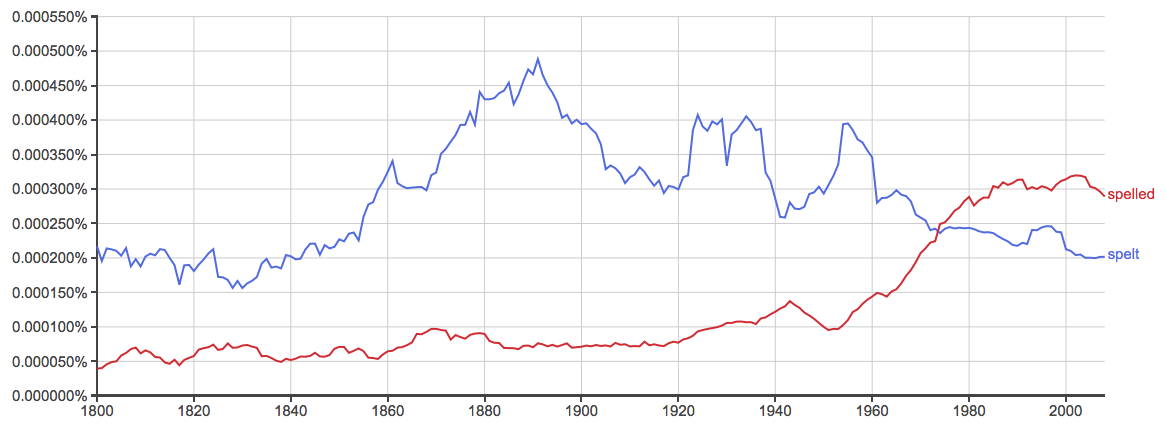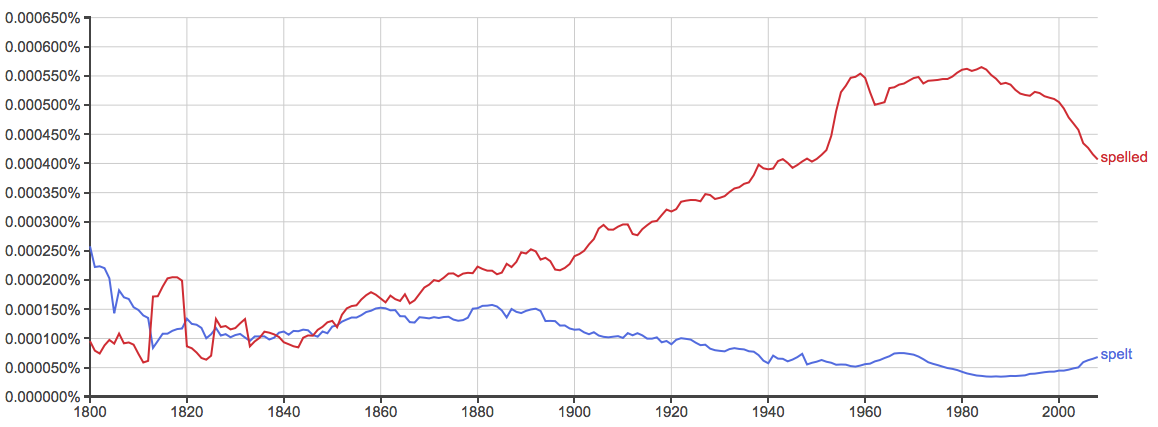пшеница спельта, полба настоящая, произнесенный по буквам
существительное
- пшеница спельта, полба настоящая (Triticum spelta)
- past и p. p. от spell
Мои примеры
Словосочетания
spelt scarf — соединение в килевой замок; соединение в косой замок 
be spelt — писаться 
Примеры с переводом
He gave his name and then spelt it. 
Он назвал своё имя и продиктовал его по буквам.
You’ve spelt my name wrong. 
Вы неправильно написали моё имя. / Моё имя пишется не так.
His name had been wrongly spelt. 
Его фамилия была неправильно написана.
Примеры, ожидающие перевода
‘Rain’ and ‘reign’ are pronounced the same even though they are spelt differently. 
Для того чтобы добавить вариант перевода, кликните по иконке ☰, напротив примера.
Возможные однокоренные слова
spelter — технический цинк, цинковый припой
misspelt — делать орфографические ошибки
заклинание, период, чары, время, очарование, означать, очаровывать
существительное ↓
- заклинание, заговор
magic spell — магическая формула
to bind a person by a spell — колдовством подчинить себе человека
- чары, очарование, обаяние; пленительная, чарующая сила
under a spell — зачарованный, находящийся под обаянием, околдованный
to cast a spell on /over/ smb. — очаровать /околдовать/ кого-л.
to come under a spell — подпасть под чары /под обаяние/, быть очарованным
to break /to remove/ a spell — нарушить очарование, рассеять чары
his spell over the public — его умение владеть аудиторией
he laid his powerful spell on the younger generation — он был властителем дум молодого поколения
- срок, время
a spell of service — срок /время/ службы
a six-hour spell of duty — шестичасовое дежурство
a spell at cardplaying — время, проведённое за картами /за игрой в карты/
for a brief spell — на короткое время
it’s your turn to take a spell at the sculls — теперь ваша очередь сесть за вёсла /грести/
to do a spell in prison — отбыть /отсидеть/ срок в тюрьме
- промежуток времени, период
- приступ (болезни и т. п.)
coughing spell — приступ кашля
to have a fainting spell — упасть в обморок
she had a bad spell — у неё был сильный приступ
girls sometimes have crying spells — девушки иногда плачут без причины
ещё 4 варианта
глагол ↓
- околдовывать; заговаривать
to spell from death in battle — заговорить от смерти в бою
to spell smth. away — прогнать /уничтожить/ колдовством что-л.
- наделять магическими, волшебными свойствами
- сменять (кого-л. в работе)
the teams spell each other every fifteen minutes — команды меняются каждые пятнадцать минут
he and other assistants spelled each other — он и другие сотрудники подменяли друг друга
- сменяться, работать по очереди
to spell at the oars — грести по очереди
- дать отдых, роздых, передышку
to spell the camels — дать верблюдам отдохнуть
ещё 7 вариантов
Мои примеры
Словосочетания
a cold spell set in sometime last week — похолодание, которое началось примерно на прошлой неделе 
to be overmastered by the mighty spell — покориться могущественным чарам 
to break / remove smb.’s spell — разрушить чьи-л. чары 
to cast / put a spell on / over smb. — околдовать, очаровать кого-л. 
a long / lengthy spell — длительный период 
a brief / short spell — короткий период 
a cold spell in January — холода в январе 
a short spell of sunny weather — несколько солнечных дней 
to have / go through a spell — переживать какой-л. период 
a spell of coughing — приступ кашля 
to spell correctly — писать (орфографически) правильно 
Примеры с переводом
How do you spell your name? 
Как пишется ваше имя?
Sorry, I spelled it wrong. 
Простите, я неверно написал.
I’ll spell for a bit. 
Я немного отдохну.
I’m afraid this spells trouble! 
Я боюсь, это повлечёт за собой неприятности!
He did a spell in prison. 
Он провёл некоторое время в тюрьме.
What word do these letters spell? 
Какое слово образуют эти буквы?
Refer to the dictionary when you don’t know how to spell a word. 
Когда не знаешь, как пишется слово, посмотри в словарь.
ещё 23 примера свернуть
Примеры, ожидающие перевода
Pupils should know how to spell commonly used words. 
…asked the sorceress to cast an evil spell over the village… 
I’m feeling a bit weak and dizzy. I think I’m having a dizzy spell. 
Для того чтобы добавить вариант перевода, кликните по иконке ☰, напротив примера.
Фразовые глаголы
spell down — победить в конкурсе правописания, победить в конкурсе по правописанию
spell out — расшифровать, разбирать, продиктовать по буквам, читать по складам
Возможные однокоренные слова
speller — орфографический справочник
spelling — правописание, орфография, написание, произнесение слова по буквам
misspell — делать орфографические ошибки
spellful — колдовской, магический
Формы слова
verb
I/you/we/they: spell
he/she/it: spells
ing ф. (present participle): spelling
2-я ф. (past tense): spelt or spelled
3-я ф. (past participle): spelt or spelled
noun
ед. ч.(singular): spell
мн. ч.(plural): spells
Бесплатный переводчик онлайн с английского на русский
Хотите общаться в чатах с собеседниками со всего мира, понимать, о чем поет Билли Айлиш, читать английские сайты на русском? PROMT.One мгновенно переведет ваш текст с английского на русский и еще на 20+ языков.
Точный перевод с транскрипцией
С помощью PROMT.One наслаждайтесь точным переводом с английского на русский, а для слов и фраз смотрите английскую транскрипцию, произношение и варианты переводов с примерами употребления в разных контекстах. Бесплатный онлайн-переводчик PROMT.One — достойная альтернатива Google Translate и другим сервисам, предоставляющим перевод с английского на русский и с русского на английский.
Нужно больше языков?
PROMT.One бесплатно переводит онлайн с английского на азербайджанский, арабский, греческий, иврит, испанский, итальянский, казахский, китайский, корейский, немецкий, португальский, татарский, турецкий, туркменский, узбекский, украинский, финский, французский, эстонский и японский.
The English language has a lot of irregular verbs. Irregular verbs are verbs that don’t take on the typical past tense spelling pattern.
Talk is an example of a regular verb. It changes from present to past by adding an “ed” to the end of the word.
- I talk.
- I talked.
Speak is an example of an irregular verb. It completely changes when it forms the past tense.
- I speak.
- I spoke.
Well, the verb to spell is actually an English verb that has both a regular and an irregular form.
- I spell. (Present)
- I spelt. (Past)
- I spelled. (Past)
Both of these forms are correct, but they’re not always interchangeable. Sound confusing? Don’t worry. I’ll explain everything you need to know about spelt vs. spelled below.
What is the Difference Between Spelt and Spelled?
In this post, I will outline the different uses of spelled vs. spelt and when it is correct to use each spelling.
Plus, at the end, I will give you a helpful trick for remembering their different uses.
When to Use Spelt

- The investigation revealed that Bradbourn’s name was spelt incorrectly on paperwork. –The Guardian
Over the 19th and 20th centuries, spelt was much more commonly seen in British writing than spelled. It wasn’t necessarily considered a mistake to use spelled in Britain, spelt just happened to be the preferred, more common spelling.
This preference seems to be waning, however, as spelled has grown in popularity in Britain in recent years (see below).
This chart is not scientific or exhaustive by any means (it only covers English books), but it is helpful in identifying trends, and the trend is clear. Whether or not spelled is actually used more frequently in British English than the once more popular spelt, we can’t be sure.
But it is clear that the frequency of spelled is on the rise in Great Britain.
Spelt as a noun. Spelt can also be used as a noun. It refers to a type of wheat that was widely cultivated in southwest Asia, the Near East, and Europe during the Bronze Age. In modern day, it is grown chiefly in Europe.
- The spelt buns need little time to rise because spelt grain reacts so swiftly with yeast, so they can be made–unusually for bread–alongside the soup. –The Telegraph
Spelt or Spelled in British English
All of this is to say that both forms (spelt and spelled) are accepted in British English. Most British, Irish, and Australian writers don’t seem to make a distinction between them.
This trend is almost certainly a result of American influence spreading (see below).
When to Use Spelled

- Icelanders’ pronunciation of place-names is confounding even when you have the words spelled out on paper. –The New Yorker
This preference in American English has been clear for quite some time.
As you can see, spelled has been the preferred spelling in American English for some time and the gap between the two is quite large.
In fact, spelt is generally considered a misspelling in American English.
If you are a student in America, or ever find yourself writing to an American audience, spelled is the correct choice.
Spelt out or Spelled out?
The most common use of to spell is, of course, to name or write in order the letters constituting a word.
- My name is spelled J-O-H-N.
And, as we learned, spelt is more common in British English, spelled is more common in American English.
What about other meanings or phrases using the word?
The phrase to spell out, to make clear or explicit, usually employs spelled.
- He spelled out the details of his plan.
You can find publications that use spelt out, but they are less frequent.
Similarly, phrases like spelled trouble, spelled disaster, spelled ruin, etc., all use spelled more frequently than spelt—in British and American English.
Trick to Remember the Difference
Still not sure when to use spelled or spelt? Here’s a helpful trick to help you remember.
Spelt is commonly used in British English. Spelt and British both have a letter “T” in them.
Summary
Should I use spelt or spelled? This depends on who your audience is.
Spelt has been the preferred choice in British English for many years, where spelled is also acceptable.
Spelled is the preferred choice in American English, where spelt is viewed as a misspelling.
Contents
- 1 What is the Difference Between Spelt and Spelled?
- 2 When to Use Spelt
- 3 Spelt or Spelled in British English
- 4 When to Use Spelled
- 5 Spelt out or Spelled out?
- 6 Trick to Remember the Difference
- 7 Summary
|
WordReference Random House Unabridged Dictionary of American English © 2023 spelt1 (spelt),USA pronunciation v.
spelt2 (spelt),USA pronunciation n.
Collins Concise English Dictionary © HarperCollins Publishers:: spelt /spɛlt/ vb
spelt /spɛlt/ n
Etymology: Old English; related to Old Saxon spelta, Old High German spelza WordReference Random House Learner’s Dictionary of American English © 2023 spell1 /spɛl/USA pronunciation
spell2 /spɛl/USA pronunciation
spell3 /spɛl/USA pronunciation
v. [~ + object]
WordReference Random House Unabridged Dictionary of American English © 2023 spell1
v.i.
spell′a•ble, adj.
spell′ful, adj.
spell3 (spel),USA pronunciation
v.t.
v.i.
Collins Concise English Dictionary © HarperCollins Publishers:: spell /spɛl/ vb (spells, spelling, spelt, spelled)
ˈspellable adj spell /spɛl/ n
vb
Etymology: Old English spell speech; related to Old Norse spjall tale, Gothic spill, Old High German spel spell /spɛl/ n
vb
Etymology: Old English spelian to take the place of, of obscure origin ‘spelt‘ also found in these entries (note: many are not synonyms or translations): |
|


